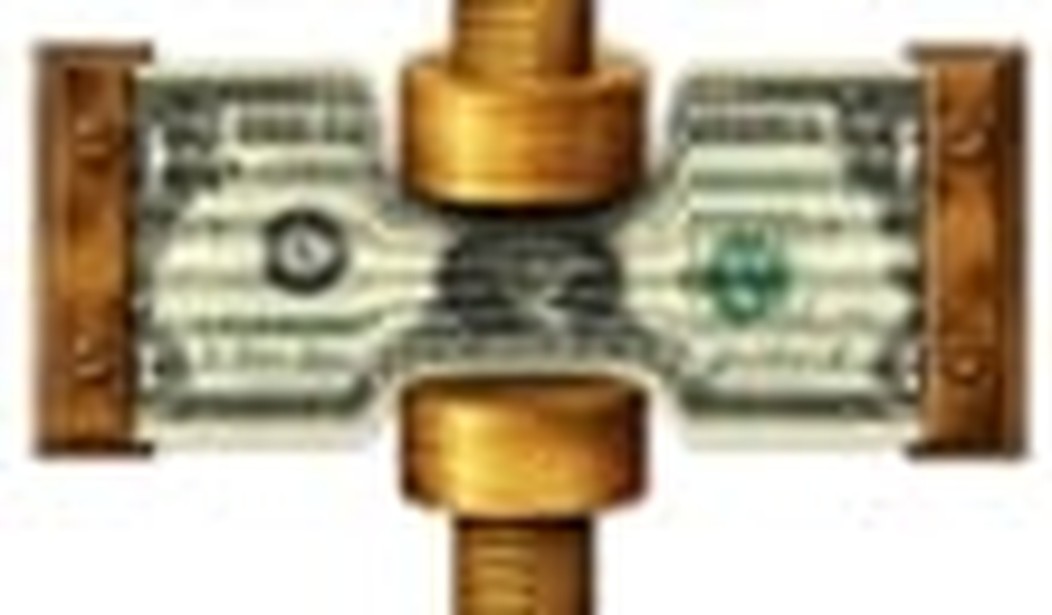Picture the money that is in your checking account as you read this. Your bank is federally insured, but something strange is occurring. As the months and years go by, the money you’ve saved is worth less and less. No one’s robbed you, but in a very real sense, you’ve been a victim of thievery.
The above is the certain result of inflation. Contrary to Federal Reserve assumptions suggesting inflation results from too much growth, the real truth is that inflation is a decline in the monetary standard. In our case, it’s a decline in the dollar’s value. And when the Federal Reserve oversees a falling dollar, it is robbing you in much the same way a thief might by removing actual dollars from your pocket.
Sadly, inflation is what Americans have experienced over the last several years. While the dollar as recently as 2001 was worth 1/250th of an ounce of gold, as this is being written a dollar would only buy 1/1000th of a gold ounce.
This helps to explain why all manner of goods, from gasoline to rent to food, have become more expensive. All are priced in dollars, and with the dollar far weaker today that it was at the beginning of the decade, each has risen alongside the dollar’s decline. This is inflation, and its first order impact is one whereby your money doesn’t buy as much as it used to.
When we take this further, we have to say that inflation is a tax; albeit a hidden one. Many of us blanch when our legislators seek to fund all manner of government spending through greater penalties on our work effort. That’s a tax we can see with the arrival of each paycheck.
Sadly, inflation is a lot more insidious. It creeps up on us gradually, but it’s a tax just the same for eroding the value of our work week by week. Even though our paychecks may look the same in terms of dollar amount, those dollars we’re receiving surely buy a lot less. The government can increase taxes by raising our rate of taxation, or through inflation it can reduce the real amount of its debt through dollar debasement. The average worker is harmed either way.
Worse, the ravages of inflation don’t just end there. Lest we forget, most of us have jobs thanks to the savings of others. The paycheck we receive each month is the direct result of someone else having saved. The saver, rather than spending the money, put the money in the bank or invested it such that entrepreneurs and businesses could access it in order to create jobs.
And inflation is most harmful to job-creating savers. First off, each day they hold onto money rather than spend it, their money is worth less. As such, there exists the incentive to spend rather than offer up job-creating capital. Secondly, those who save do so in the hope that their investment will be worth more in the future. When the Fed allows the value of the dollar to decline, investors see any investment gains eroded by the falling unit of account. Rather than risk their money on uncertain ventures, they consume it.
What this means for the average worker is that just as inflation makes the money we earn worth less, it also reduces the amount of money available to fund our wages. That is so because when we inflate, investment capital shrinks. Inflation is a sharp knife that cuts myriad ways, all to the detriment of our individual economic health.
All of this speaks to a fairly consistent pattern when it comes to successful presidencies. If it’s agreed that falling currency values enervate and often impoverish the average worker, we can then see why certain presidents succeeded, while others failed. Richard Nixon’s decision to take us off the gold standard opened the inflationary floodgates, and the falling dollar had voters unhappy enough such that the minor break-in that was Watergate ultimately ended his presidency. Inflation similarly made Jimmy Carter a one-term president.
Conversely, Ronald Reagan and Bill Clinton both presided over a rising dollar. The economy and stock markets under each president soared. Reagan emerged from the Iran-Contra affair unscathed, while Bill Clinton managed to escape impeachment given the electorate’s happy countenance when it came to their personal economic circumstances.
Like Nixon and Carter, George W. Bush has overseen what in GDP terms is a rising economy. Still, the dollar has been in freefall under him, and the electorate is unhappy. This is always the case. Voters will excuse many mistakes, but when government policies undermine the value of their earnings, they necessarily become unhappy.
So when we look to the presidential candidates in our midst, we in many ways shouldn’t be surprised by the success of Barack Obama’s populist message. Voters have a real economic complaint, and it has to do with an inflation that has taxed their earnings all the while making it harder for them to increase their pay. Voters DO want change, and while it’s safe to say Obama’s ideas aren’t pro-growth, it’s also true that the inflation in our midst has made his message of hope far more appealing than it would otherwise be in a normal, inflation-free environment.
John Tamny is editor of RealClearMarkets, and a senior economist with H.C. Wainwright Economics. He can be reached at [email protected]









Join the conversation as a VIP Member